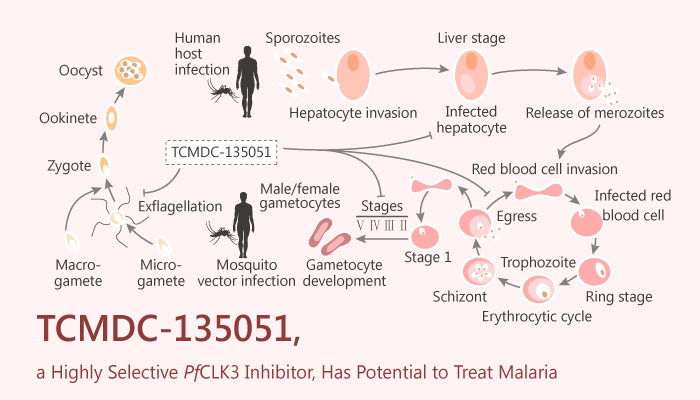PfCLK3 is a protein kinase essential for maintaining the asexual blood stage of both P. falciparum and P. berghei. In mammalian cells, the CLK protein kinase family and the closely related SRPK family are crucial mediators of multiple phosphorylation events on splicing factors. They include serine-arginine–rich (SR) proteins, which are necessary for the correct assembly and catalytic activity of spliceosomes. The requirement for next-generation antimalarials is both curative and transmission-blocking. Thus, the identification of previously undiscovered druggable molecular pathways is necessary. In this study, a high-throughput screen identifies selective PfCLK3 inhibitors. TCMDC-135051 is a member of a series of molecules. This series shows a similar inhibitory activity against PfCLK3. TCMDC-135051 shows the highest selectivity and potency for inhibition of PfCLK3. It also shows lower activity against the closely related human kinase CLK2.

TCMDC-135051 shows the highest selectivity and potency for inhibition of PfCLK3.
TCMDC-135051 is part of the TCAMS and has antiparasiticidal activity (EC50=320 nM). The activity of TCMDC-135051 in parasite viability assays was significantly reduced by ~1.5 log units in both clones of G449P. It provides further evidence that TCMDC-135051 kills parasites via inhibition of PfCLK3. In addition, TCMDC-135051 prevents trophozoite-to-schizont transition, kills the parasite with rapid kinetics, and disrupts gene transcription inhibition of PfCLK3 by inhibiting PfCLK3.
TCMDC-135051 has parasiticidal activity at multiple parasite species, blocks gametocyte development, and reduces transmission to the mosquito vector. TCMDC-135051 shows potent activity against P. berghei sporozoites in a liver invasion and development assay. It shows a pEC50 of 6.17 (EC50=0.40 μM) with low toxicity. Besides, TCMDC-135051 shows potent parasiticidal activity in asexual-stage Pf2004 similar to that seen in asexual 3D7 and Dd2 parasites.
In summary, TCMDC-135051 is a highly selective and potent protein kinase PfCLK3 inhibitor with low off-target toxicity. PfCLK3, as a target for drugs, has the potential to offer a cure-to be prophylactic and transmission-blocking in malaria.
Reference:
Alam MM, et al. Science. 2019 Aug 30;365(6456). pii: eaau1682.